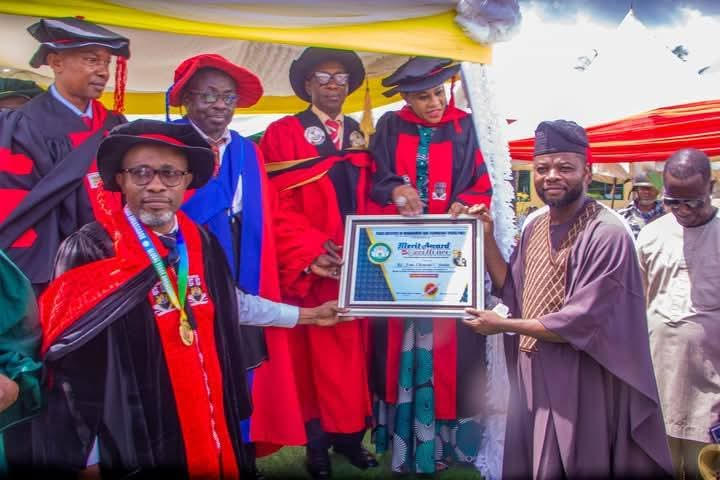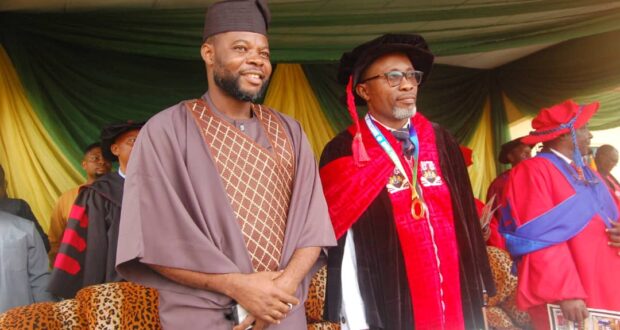By Christian George
 The serene town of Abak in Akwa Ibom State recently came alive with celebration as Peace Institute of Management and Technology, popularly known as Peace Poly, hosted its combined matriculation and convocation ceremony.
The serene town of Abak in Akwa Ibom State recently came alive with celebration as Peace Institute of Management and Technology, popularly known as Peace Poly, hosted its combined matriculation and convocation ceremony.
The event, held at the institution’s pavilion along KM 4 Abak, Ikot Abasi Road, Mbarakon, was a historic gathering that symbolized growth, academic achievement and community progress. The ceremony brought together students, parents, invited guests and prominent stakeholders from across the state and beyond.
 With precision and elegance, the institution, which is duly licensed and accredited by the Federal Ministry of Education and the National Board for Technical Education (NBTE), has strong collaboration with reputable institutions in Nigeria and around the world demonstrated its firm commitment to its motto—“Knowledge for Empowerment”.
With precision and elegance, the institution, which is duly licensed and accredited by the Federal Ministry of Education and the National Board for Technical Education (NBTE), has strong collaboration with reputable institutions in Nigeria and around the world demonstrated its firm commitment to its motto—“Knowledge for Empowerment”.
Among the dignitaries present were the institution’s principal officers who have worked tirelessly to steer Peace Poly to its current pedestal of academic excellence. Leading the list was Apostle (Prince) Udosen E. E., the Proprietor and BOT Chairman; followed by Prof. (Amb.) Peace E. U., the dynamic Rector and Head of Administration.
Also in attendance were Dr. Joseph I. Udo, Director of Academic Planning; Mrs. Idorenyin J. Udoudo, the Registrar; Dr. Savior O. Ekpe, Director of General Studies and other senior scholars and administrative officials who have helped to build and maintain the vision of Peace Poly including Princess (Dr) Victoria Ibokette.
 The day wasn’t solely about academic celebration. It was also a moment of recognition for those whose contributions to society and leadership in public service have inspired development and transformation. Foremost among these was Hon. Clement Jimbo, Member of the House of Representatives for Abak/Etim Ekpo/Ika Federal Constituency. A trained Quantity Surveyor and a member of the Nigerian Institute of Quantity Surveyors as well as member of the Royal Institute of Chartered Surveyors (RICS), London, Hon. Jimbo exemplifies what it means to serve with excellence, integrity, and compassion.
The day wasn’t solely about academic celebration. It was also a moment of recognition for those whose contributions to society and leadership in public service have inspired development and transformation. Foremost among these was Hon. Clement Jimbo, Member of the House of Representatives for Abak/Etim Ekpo/Ika Federal Constituency. A trained Quantity Surveyor and a member of the Nigerian Institute of Quantity Surveyors as well as member of the Royal Institute of Chartered Surveyors (RICS), London, Hon. Jimbo exemplifies what it means to serve with excellence, integrity, and compassion.
A native of Ikot Oku Ubara in Ediene, Abak LGA, Hon. Jimbo’s educational journey—from Army Children School II, Calabar to West African People’s Institute and eventually the University of Uyo—has shaped a leader with deep intellectual grounding and practical vision. Since assuming office, he has become known for his innovative, transparent, and impact-driven leadership style.
In less than one year, Hon. Jimbo has delivered empowerment programs that directly benefit hundreds of his constituents. His record is as diverse as it is remarkable. From ICT training for 75 youths, who also received HP laptops, to cosmetology training for 31 young women accompanied by startup grants, his empowerment approach is practical and sustainable. Additionally, another 62 individuals were empowered with hairdryers and sewing machines, each supported with capital to begin their ventures.
In a bold move to promote skilled labour and entrepreneurship, he also trained 200 youths in the niche field of silk plastering and provided starter packs, ensuring the skills learned could translate into immediate income. Beyond vocational training, he distributed four first-grade Toyota Camry cars to select constituents and gave business grants of N50,000 each to 93 women. Food palliatives—4,500 bags of 10kg rice, 50 bags of 50kg rice, beans, garri, vegetable oil, tin tomatoes, and other essentials—were distributed generously.
In response to flood crises, he provided 300 bags of rice, beans, and garri, along with dozens of cartons of oil and seasoning, and blankets to displaced persons. Not content with temporary relief, Hon. Jimbo is also focused on sustainable empowerment through job creation. He has facilitated employment for constituents into critical federal agencies, including the Nigerian Navy, Army, Police, Civil Defence Corps, the Federal Civil Service, and the FCT Administration. These jobs have changed the lives of many young people in the area, pulling them from the margins into productive national service.
Infrastructure-wise, he has executed projects that directly improved daily living in the constituency. Notable among these are the completion of the Abak Village Hall, grading of the 8.10km Ediene Abak–Etinan road, and the installation of solar-powered street lights in Ediene Abak and Premium FM Avenue among many communities within his constituency. These projects have enhanced mobility, security, and night-time business activity across communities.
His legislative performance is equally commendable. He has successfully sponsored two major bills for the establishment of the Federal School of Medical Laboratory Science in Midim, Abak, and another for a National Commission for Technology Transfer, which is advancing through legislative processes. His motions in the National Assembly address urgent local and national concerns—ranging from the collapsed Obiobom Bridge in Abak, to food insecurity, unlawful detention of journalists, amendments to pension laws, and calls for accountability in fiscal management.
His public service also includes pursuing justice for individuals through petitions. He has petitioned the Nigerian Army on land compensation for Ibagwa communities, demanded the release of illegally detained persons, and advocated for reinstatement of wrongly dismissed public servants. These efforts reflect his attentiveness to justice, equity, and good governance.
Hon. Jimbo’s service has garnered over 25 awards from reputable bodies. Among them are the Award of Distinction from the International Network of Christian Students/Youth, the Distinguished Merit Award from Nigerian Youth League, the Most Humanitarian Lawmaker of the Year from the 10th National Assembly Merit Awards, and the International Humanitarian Ambassador recognition from a global peace initiative.
Other honours include community service awards, youth inspiration recognitions, and commendations for legislative excellence, all within the past three years. His approach to politics is rare in today’s landscape—deeply rooted in compassion, evidence-based governance, and sincere grassroots engagement. He is widely seen as a symbol of hope, especially for the youth who seek to see governance that reflects empathy and foresight.
At the Peace Poly ceremony, his presence was more than symbolic. It was an embodiment of what becomes possible when vision, education, and leadership converge for the common good. The graduating students were reminded that success is not merely measured by academic credentials, but by how one uses knowledge to serve society.
As the event concluded with jubilation and prayers for future achievements, there was a renewed sense of purpose among staff, students, and the local community. The seamless integration of education and community service witnessed at the ceremony is a model for institutions and leaders nationwide.
Peace Poly, through the stewardship of its management and partnership with visionary leaders like Hon. Jimbo, has positioned itself as more than a centre for learning—it is a centre for transformation. With future goals aimed at program expansion, infrastructure upgrades, and industry-academic collaborations, the school is clearly charting a path toward excellence.
The 2025 matriculation and convocation ceremony was not just a celebration of academic milestones—it was a reflection of what is possible when education meets purpose and leadership embraces the people. In the words echoed throughout the day, “Knowledge for Empowerment” is not just a motto at Peace Poly—it is a living reality.
 Newsfront Online Newsfront Online
Newsfront Online Newsfront Online




